|
I don’t know if you read along with the church’s lectionary, or if you even know what it is, or where to find it. If you’re interested, I can send you the link.
Today there is an Old Testament reading from Exodus 24, a liturgical Psalm, number 134, and a Gospel selection from John. Let me read the Exodus passage for you: “Then [God] said to Moses, ‘Come up to the Lord, you and Aaron, Nadab, and Abihu, and seventy of the elders of Israel, and worship at a distance. Moses alone shall come near the Lord; but the others shall not come near, and the people shall not come up with him.’ Moses came and told the people all the words of the Lord and all the ordinances; and all the people answered with one voice, and said, ‘All the words that the Lord has spoken we will do.’ And Moses wrote down all the words of the Lord. He rose early in the morning, and built an altar at the foot of the mountain, and set up twelve pillars, corresponding to the twelve tribes of Israel. He sent young men of the people of Israel, who offered burnt-offerings and sacrificed oxen as offerings of well-being to the Lord. Moses took half of the blood and put it in basins, and half of the blood he dashed against the altar. Then he took the book of the covenant, and read it in the hearing of the people; and they said, ‘All that the Lord has spoken we will do, and we will be obedient.’ Moses took the blood and dashed it on the people, and said, ‘See the blood of the covenant, that the Lord has made with you in accordance with all these words.’ Then Moses and Aaron, Nadab, and Abihu, and seventy of the elders of Israel went up, and they saw the God of Israel. Under his feet there was something like a pavement of sapphire stone, like the very heaven for clearness. God did not lay his hand on the chief men of the people of Israel; also they beheld God, and they ate and drank.” (24: 1-11) The Exodus passage shares with us a most ancient tradition. When we read these words, because they sound so strange to us, so foreign to our understanding of God, we are reaching back into the earliest days of our shared Jewish/Christian faith. We’re watching it begin to form. You know when telescopes look out into the universe, the farther away the light source, the older it is. Light takes time to travel. It’s fast, really fast, 186,000 miles/second fast. But it still takes time. The light from the sun, which is 93 million miles away, takes about 8 and half minutes to reach earth. The sun could be exploding right now, and we wouldn’t even know it, well, at least not for another 8 and a half minutes. And when telescopes look at distant stars and galaxies, they’re seeing light from the past, sometimes billions of years in the past. When we hear stories like the fragment shared in Exodus today, we’re reaching back to the very beginning of faith, the beginning of how people in our tradition thought about God. These fragments are our telescope into the past. And by understanding where we came from, we can better understand where we are and hopefully where we’re supposed to go. The relic of a fragment that I’m talking about is the picnic with God on Mount Sinai. Instead of prepping by making potato salad and iced tea, Moses prepares basins full of the blood of sacrificed animals. Half he pours on the altar to God as an offering of life-blood. The other half Moses sprinkles over the people to sanctify and protect them, “offerings of well-being to the Lord” it says. The sacrificial death of these animals seems to appease God because the 74 elders up on Mount Sinai see God in His heavenly glory, and then it is written, “God did not lay his hand on them.” Those are strange words. It seems that God holds back His anger?, His disgust?, with these mortals. He doesn’t lay His hands on them. He doesn’t harm them. It is only at a safe distance that the 74 elders picnicked with God. They must have kept a wary eye on their God. This is what it meant to fear the Lord. It wasn’t only reverence. It was fear. God’s holiness was so other than our mortality that to come into the presence of the divine was life-threatening. God seems a little bit repulsed by humans. Moving from this strange relic of the ancient past, let’s now share the Gospel: “After these things Jesus showed himself again to the disciples by the Sea of Tiberias; and he showed himself in this way. Gathered there together were Simon Peter, Thomas called the Twin, Nathanael of Cana in Galilee, the sons of Zebedee, and two others of his disciples. Simon Peter said to them, ‘I am going fishing.’ They said to him, ‘We will go with you.’ They went out and got into the boat, but that night they caught nothing. Just after daybreak, Jesus stood on the beach; but the disciples did not know that it was Jesus. Jesus said to them, ‘Children, you have no fish, have you?’ They answered him, ‘No.’ He said to them, ‘Cast the net to the right side of the boat, and you will find some.’ So they cast it, and now they were not able to haul it in because there were so many fish. That disciple whom Jesus loved said to Peter, ‘It is the Lord!’ When Simon Peter heard that it was the Lord, he put on some clothes, for he was naked, and jumped into the lake. But the other disciples came in the boat, dragging the net full of fish, for they were not far from the land, only about a hundred yards off. When they had gone ashore, they saw a charcoal fire there, with fish on it, and bread. Jesus said to them, ‘Bring some of the fish that you have just caught.’ So Simon Peter went aboard and hauled the net ashore, full of large fish, a hundred and fifty-three of them; and though there were so many, the net was not torn. Jesus said to them, ‘Come and have breakfast.’ Now none of the disciples dared to ask him, ‘Who are you?’ because they knew it was the Lord. Jesus came and took the bread and gave it to them, and did the same with the fish. This was now the third time that Jesus appeared to the disciples after he was raised from the dead.” ( 21: 1-14) Here we have another story of a picnic with God. Scholars don’t know where this Chapter 21 came from. They’re pretty sure John’s Gospel ended originally at the end of Chapter 20. Read it for yourselves and you’ll hear the ending. It’s obvious. But someone thought more needed to be said and they added Chapter 21. It begins with the story of the picnic with Jesus. There’s a lot going on in this story, but I’d like to look at it from the perspective of the last picnic-with-God story we just heard from Exodus. Jesus shows up casually on the shore. The disciples at first don’t even know it’s the risen Jesus. He must not have a glowing appearance. He must look like one of us. When Jesus performs the miracle of the great catch of fish, they realize it’s Jesus back on shore. Well, if it’s Jesus I better put some clothes on, thinks Peter. God can’t see me naked. That’s about all the preparation there is. Jesus has already got some breakfast cooking on the fire. He doesn’t want to embarrass His friends so He tells them to bring along some of their fish too. And then the risen Saviour and these seven fishermen eat together, sitting together around a charcoal fire on the beach, sharing one another’s food, and as I imagine it, laughing and telling stories. The once fearsome God of that picnic on Mount Sinai has become the friend Jesus. The scary holiness of God has become the holiness of a Saviour who is like us and who loves us. Our image of God has changed from the fearsomeness of the Lord to the nearness of the Lord. This is the progression of faith that we see right on the pages of Scripture. This is the direction in which it continues and will carry us forward. Worship, religion, spirituality, church are about bringing God and us into a closer, more intimate relationship. That’s why we’ve gathered this evening. To share a mid-week moment with Christ and with each other. Both are holy communions. In closing, I turn to the prayer of the Psalmist: “Come, bless the Lord, all you servants of the Lord,… Lift up your hands to the holy place, and bless the Lord. May the Lord, maker of heaven and earth, bless you from Zion.” (134: 1-3) Amen.
0 Comments
Recording of live-streamed Service on April 26, 2020For larger print text or to download, click the PDF file below.
Youth Group Flower Sale - May 16th.
The church Youth Group is again this year running a Spring Flower Sale. If you are not on the church email list and would like to receive an order form, please drop me an email ([email protected]). The order deadline is May 10th. Thank you for supporting the young people of the congregation. Rev. Randy What does Jesus in the tomb mean?Throughout the year, the Southern New England Conference of the United Church of Christ produces the Daily Lectionary for use by churches. These are the suggested readings for Holy Saturday, April 11th: Job 14:1-14; Psalm 31:1-4, 15-16; Matthew 27:57-66; and 1 Peter 4:1-8. I would encourage you to read these short selections as part of your Lenten practice.
Today is the final day of Lent. Jesus has died and has been buried in the tomb of Joseph of Arimathea. After the somber tones of Good Friday, I know that many a Christian on Holy Saturday is already anticipating the joys of Easter. It’s hard not to. But for as much as we want to celebrate the empty tomb, we really need to pause and consider that on Holy Saturday the dead body of Jesus is still inside the sepulcher. Death is not a mask here worn in some sort of Greek tragedy. Jesus is not “acting” dead. Jesus has died and on Holy Saturday Jesus is dead. I emphasize this message because scholars have batted around the implications of what Jesus’ being really dead may mean theologically. In the life of Jesus, God has experienced the joys and sorrows, the hopes and limitations of human nature. In Jesus, on Good Friday, God has experienced suffering and death. Scholars push this further. They wonder out loud if on Holy Saturday, if while Jesus lies dead in the tomb, if God experiences the loss and separation that all of us mortals know all too well. In other words, is the reality of Jesus’ death the divinely accepted experience of non-being? Does the God who revealed Himself to Moses as I AM accept in Jesus’ death the reality of I-am-not? Let me go back to the oldest, extant piece of Christian literature we have, 1 Thessalonians, to help with this discussion. The translators of the New Revised Standard Version of the Bible, in my humble opinion, have done us no favours by translating “fallen asleep” as “died.” Paul writes with intention when he uses two different words. Let me share with you the translation without their change to the same word: “For since we believe that Jesus died (άποθήσκω) and rose again, even so, through Jesus, God will bring with him those who have fallen asleep (κοιμάω).” (4:14) You don’t have to read Greek to see that these two words are not the same. Paul is telling those earliest Christians that Jesus faced the harsh reality of death: “Jesus died.” Because “Jesus died,” faith now allows Christians to face mortality differently. Christians may look upon death as having “fallen asleep.” The contrast is intentional. Jesus faced the full, brute force of death so that we would not have to. What does this mean for God? We can only wonder. Is it possible that in that tomb of Joseph of Arimathea while the dead body of Jesus lay there that God, in Jesus, experienced the reality of non-being? Did God experience the reality of separation that uncaring-death forces upon all of us mortals? Is there a profound mystery in Jesus experiencing dying and in Jesus experiencing death? The earliest testimony to Easter is not that Jesus resurrected, but that God raised Jesus from the dead. Jesus was acted upon. Does this imply the reality of Jesus’ death and God’s conquest of death? These question marks are where Lent ends and where Easter begins. The reality of Jesus’ dying and death are outmatched by the reality of the empty tomb and new life. This is why we great the dawn of the year’s most holy of days with shouts of Alleluia – God be praised! And I invite you to join us as we celebrate the joyous and wondrous mystery that is Easter. "James, earn this. Earn it."Throughout the year, the Southern New England Conference of the United Church of Christ produces the Daily Lectionary for use by churches. These are the suggested readings for Good Friday, April 10th: Psalm 22; Isaiah 52:13—53:12; John 18:1—19:42; and Hebrews 4:14-16; 5:7-9. I would encourage you to read these short selections as part of your Lenten practice.
I think the conclusion to Saving Private Ryan is one of the most powerful movie scenes that I have ever watched. [https://www.youtube.com/watch?v=X32O5_NVhxU] Capt. John Miller’s dying words are to Private Ryan. He has led a mission to send Private Ryan home after all of his brothers have died in battle. He whispers to Private Ryan, “James, earn this. Earn it.” And he dies. The closing scene then jumps decades into the future and shows an elderly James Ryan at the military cemetery where Capt. Miller is buried. Ryan approaches his grave and kneels down. We watch from behind the Captain’s monument, a white marble cross. We listen as James Ryan says, “I’ve tried to live my life the best I could. I hope that was enough. I hope that at least in your eyes I have earned what all of you have done for me.” These words are directed obviously to the memory of Capt. Miller. I would, however, on this Good Friday, ask you to see this scene differently and to listen to the words differently. Capt. Miller and others died for the sake of James Ryan. They died so he could live. And James Ryan lived his life in constant gratitude for their sacrifice. If you clicked on the link above to watch or re-watch the closing scene, I’d ask you to watch it again. This time watch it and imagine that his words are being said to Jesus who is symbolized by the cross that dominates the foreground of the closing scene. Think about our belief that Jesus dies for us. Think about Jesus as our Saviour, the one who died so that we could live. Think about how we would translate those dying words of: “Earn this.” Watch it again and imagine that marble cross as the Golgotha cross: https://www.youtube.com/watch?v=X32O5_NVhxU The power and the emotion of that final scene is because of the sincere connection and between Captain and Private, and because of Private Ryan’s deep gratitude. Good Friday asks us to seek that same sort of personal relationship between Jesus and us, between us and the one who sacrificed His life so that we could live. Good Friday can hopefully inspire each of us to live “life the best I could.” Good Friday must be a personal experience of Jesus’ sacrifice endured for us if it is to be anything more than morbid. It has to change the way we live. A statement of belief older than the biblical book that recorded it states: “[Jesus] was handed over to death for our trespasses and was raised for our justification.” (Romans 4:25) In other words, the earliest Christians believed that Jesus saves us, and that Jesus also inspires us to righteousness – the same Greek root-word as justify. This is the message of “Earn this.” It’s not enough to be saved; we have to live like we’ve been saved. The author of the Epistle to the Hebrews understood the real-life sacrifice of Jesus on the cross. He writes: “For we do not have a high priest [Jesus] who is unable to sympathize with our weaknesses, but we have one who in every respect has been tested as we are, yet without sin.” Capt. Miller had credibility with his troops because he fought alongside them. Similarly, in Christ, God was not protected in heaven’s sanctuary. God, in Christ, fought the same life-battles as do we. Jesus lived and died in His full humanity and made that a part of the nature of God. “In every respect” Jesus was like us except for the fact that He never wavered. He never sinned. On this solemn and sacred day when we remember Jesus’ torture and death, may we renew our relationship with the crucified God, and as we look at Jesus’ cross may we get the message of “Earn this.” Time and TimelessnessThroughout the year, the Southern New England Conference of the United Church of Christ produces the Daily Lectionary for use by churches. These are the suggested readings for Thursday, April 9th: Exodus 12:1-14; Psalm 116:1-2, 12-19; John 13:1-17, 31b-35; and 1 Corinthians 11:23-26. I would encourage you to read these short selections as part of your Lenten practice.
How many days in particular change the world? An eminent biblical scholar, John P. Meier, authored a two-volume tome for the Anchor Bible series entitled A Marginal Jew: Rethinking the Historical Jesus. It was published in 1991. These books were and remain critical to my understanding of the Bible and through the Bible of Jesus. I respect his scholarship. Now, no one knows for certain on what particular day Jesus of Nazareth died. For as important as He is to us, Jesus was crucified as a common insurrectionist by the Romans who crucified many a common insurrectionist. This means that there are no extant, formal records of His death. We do, however, believe with a great deal of certainty that His crucifixion was ordered by the Roman Prefect Pontius Pilate, and since Pilate was a notable man within the Roman government, we know from contemporaneous records that he ruled from 26-36 AD. For various reasons, it is calculated that Jesus died within the range of 30-33 AD. During only two of those years did the fourteenth of Nisan (from today’s Exodus passage) probably fall on a Friday. They would correspond with April 7, 30 AD and April 3, 33 AD. Meier shies away from the year 33 because this would indicate a longer term of public ministry than the Gospels indicate. He favours by a process of logical elimination the date of April 7, 30 AD as the particular day on which Jesus was crucified and died. This was a particular day that changed the world. Today is Maundy Thursday. On the liturgical calendar, this is the day prior to Jesus’ crucifixion. This is the day of the Last Supper. This is when Jesus instituted the sacrament of Holy Communion and gave us the new mandatum, commandment, to love one another “as I have loved you,” as it says in today’s Gospel selection. This is specific enough to prevent us from imagining what we want “love one another” to mean. It means serving others. It means serving a greater good. It means the humbleness to realize our basic equality. It means as we say during every Communion Service, “Sharing by all will mean scarcity for none.” And we may assume that the particular day was April 7, 30 AD (Remember that in the Jewish tradition the day begins at sunset.), but we have a greater trust in the events and continuing importance of that day, whatever the particular day. Paul shares with us today his account of the institution of the Lord’s Supper and he uses technical terminology: “For I received from the Lord what I also handed on to you …” In an age when oral tradition was extremely serious, this terminology indicates that this tradition was handed on person to person with the utmost care for its authenticity. Paul puts into writing a record that reaches back to the first days of the faith. And in that tradition, Jesus says, “‘Do this in remembrance of me.’’ And we have for almost 2,000 years, and we will this evening, on this particular day. Particular dates can change the world. Jesus’ crucifixion ended His human life on the particular date of April 7, 30 AD, but timelessness was waiting on the other side of that Sabbath. From that timelessness, Jesus reaches out to us in our ever constant and changing "now" when we share in Communion and when we practice Jesus’ “new commandment.” These are the holiest days of Holy Week, and they are not history. They are not past. They are mysteries that surround us still. I hope and pray that we will choose to be embraced by the mystery of this timelessness on these particular days. |
NewsFaith, love and chitchat. Categories
All
Archives
June 2024
Follow
|
||||||
|
SERVICE TIMES
Sunday 9:30-10:30am Children Sunday School 9:30-10:30am Nursery care available during worship DONATE Make a single or recurring contribution by clicking here |
FOLLOW
|
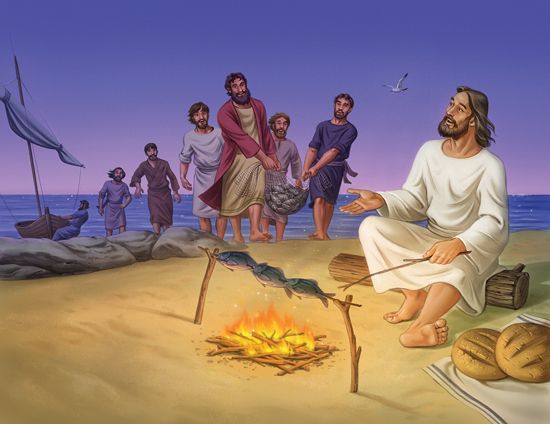
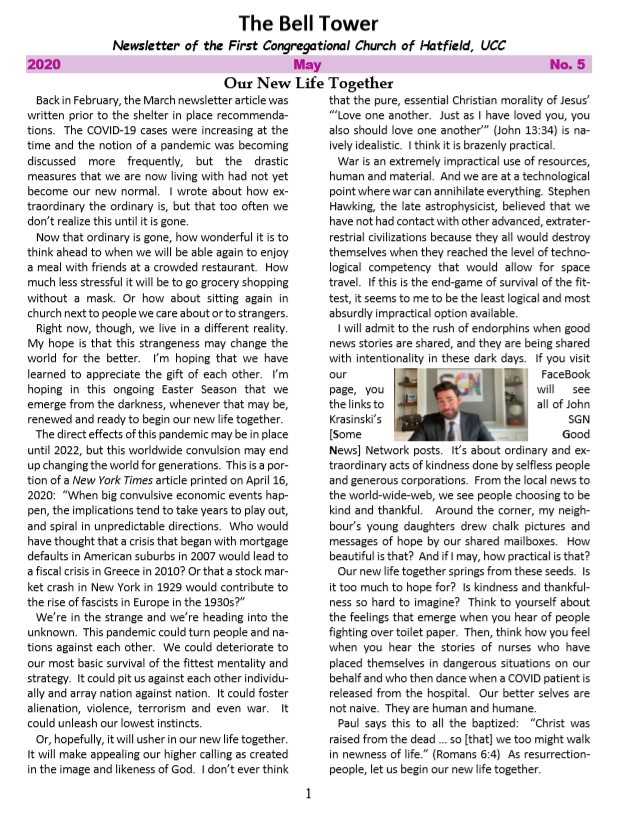
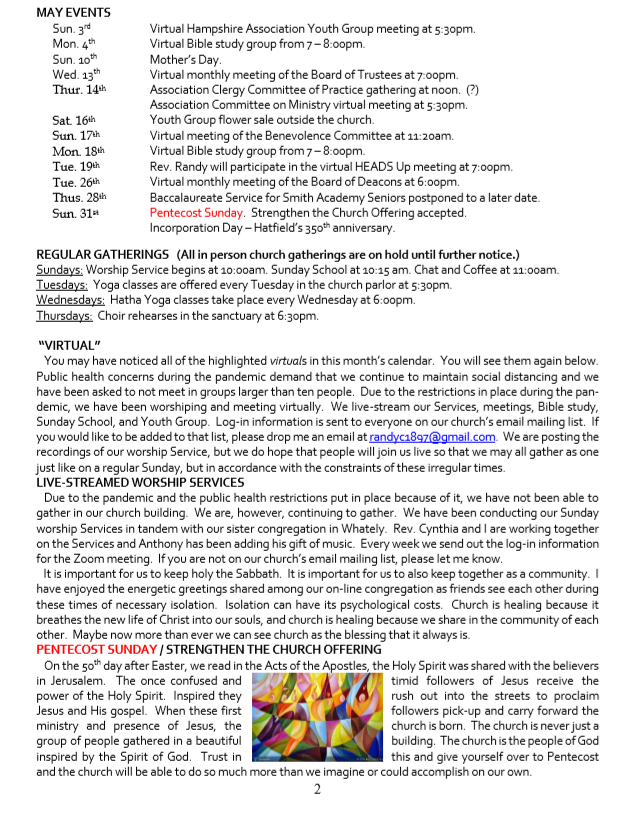
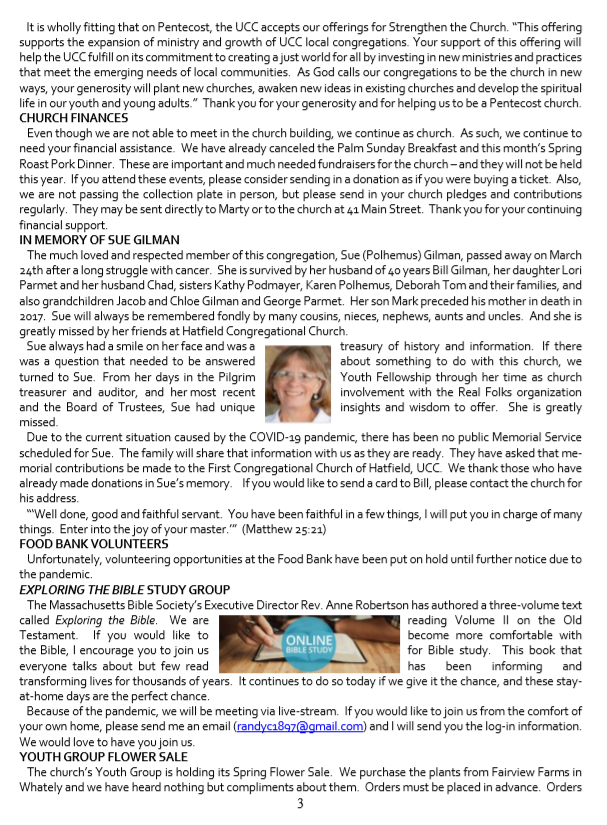
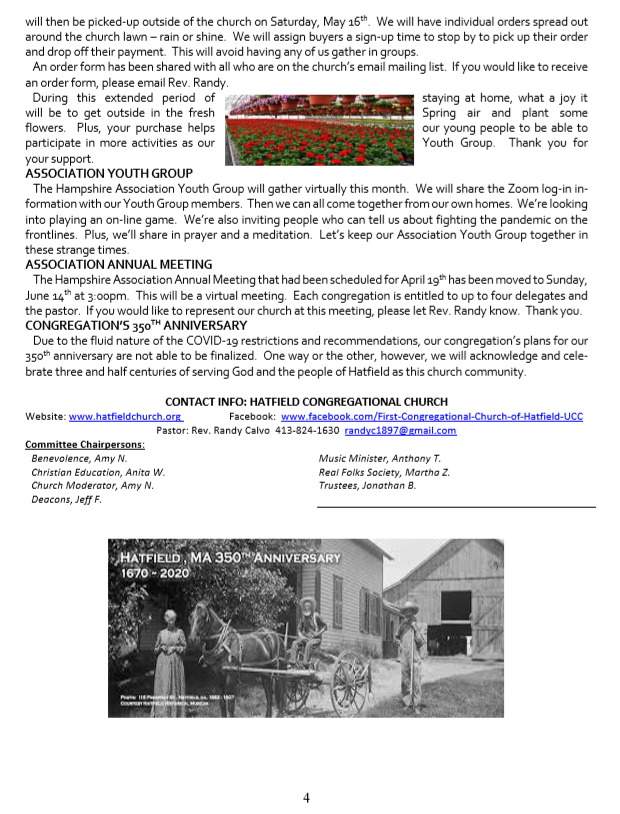
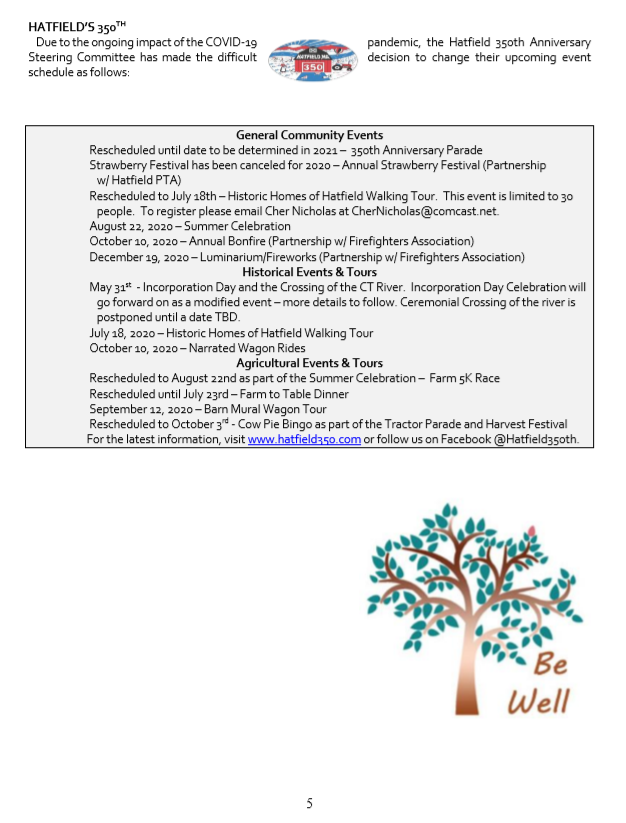


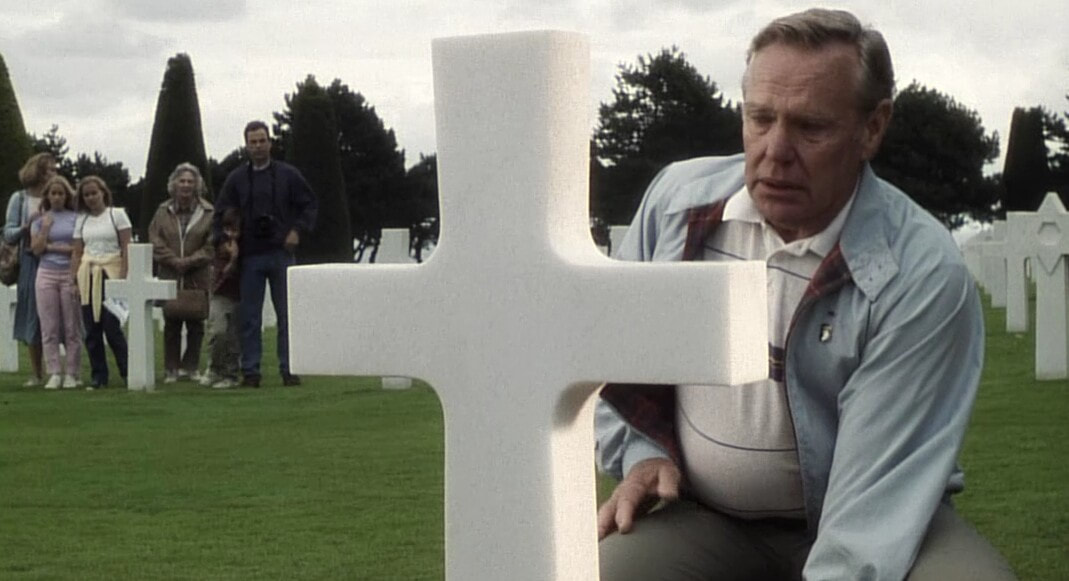
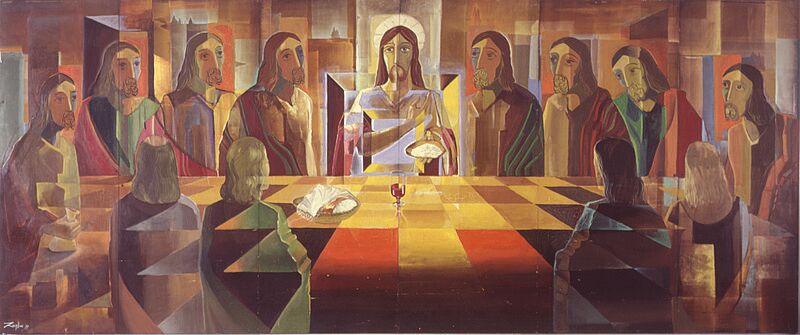
 RSS Feed
RSS Feed
